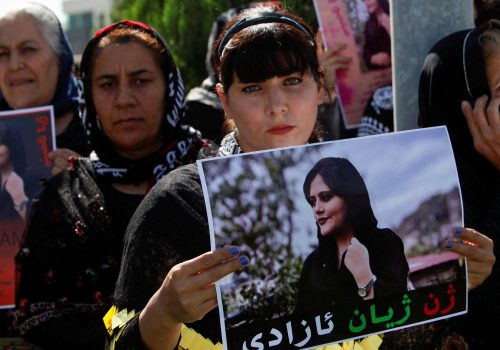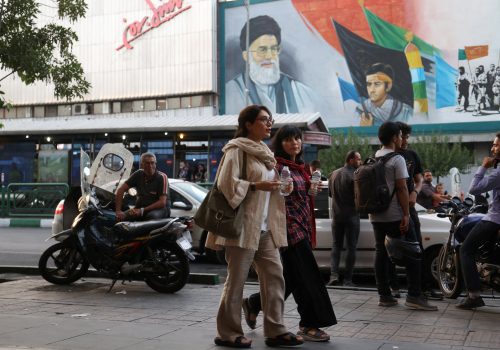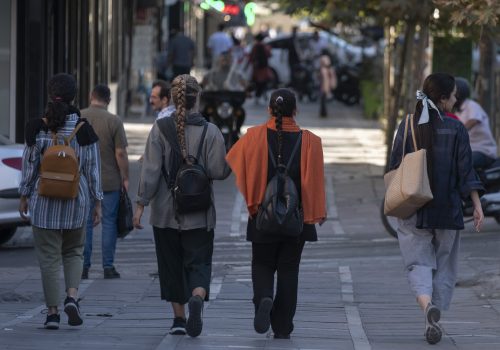Yes, I’m ‘Trash,’ but I love Iran
It’s June 2021, and I didn’t want to say goodbye. After rushed hugs, my parents stood on the curbside as my taxi to Tehran’s Imam Khomeini International Airport veered away. Maman held tears back and smiled. I saw something break in my baba. As we waved to each other, I knew deep down I wouldn’t be able to return.
Baba died forty days after Iran’s morality police killed Mahsa Jina Amini in September 2022, an incident that provoked months of nationwide anti-government protests. After years in jail as a political prisoner, losing almost all his friends to a political purge, executions, and soul-shattering isolation, when Iran was tinted red with the blood of its youth, my father’s heart couldn’t take more. He passed away.
I couldn’t even hold his cold hands for one final moment, lie to maman that everything would be alright, and touch the warm earth that embraced baba for the last time. Months later, my mother brought me a fistful of soil from his grave. My share of Iran—where I left my heart.
Days after Amini was killed, Iran-based singer Shervin Hajipour released a hit song, Baraye (“For the sake of”), based on actual tweets written by Iranians. The song captivated the nation and became the de facto anthem of the Woman, Life, Freedom uprising—a love letter to Iran.
Hajipour captured the nation’s heart, and for that crime, he was arrested on September 29, 2022 and accused of “propaganda against the regime” and “inciting violence.” Almost a week after his arrest, he was released on bail as “his case went through the legal process,” according to a state prosecutor. He may have been released from jail, but, in reality, he was placed in a bigger cage and intimidated into silence.
In the following months, people watched him swallow bitter tears while standing tall and unbroken. Many Iranians felt seen by the world and found joy when he won a Grammy award for Best Song For Social Change. But Iranians’ hearts wrenched when he wrote on X, formerly known as Twitter, “I feel that I am done with this world.” Then hope rekindled in the hearts of Iranians when he wrote a little over a month later, “It took me some time, but I will be back.”
Hajipour delivered on his promise on January 12 with a new hit song that soared high in a few hours. Ashghal (“Trash”) received thirty million views and 1.7 million likes on Instagram—an extremely popular social media platform that is blocked and requires circumvention tools to access in Iran—in less than twenty-four hours after its release.
The track starts with bitter notes of solitude. “I am trash, trash who had no one to even post bail for him.” It continues with reflections on “hearts bleeding,” cut by the hollowness of prominent figures we looked up to and who didn’t show up. Then he lists the ordeal he has endured since his arrest: he has been sidelined and marginalized; refused permission to sing by authorities; and stranded in limbo between courts. But Hajipour follows this up by weaving a new path, thanking friends and family who did not leave his mother alone while he was incarcerated.
Hajipour sings of isolation, of being “thrown away like trash… Yes, we are not the same. But I am staying so you won’t stand alone. I am staying so you wouldn’t say that I bolted. I’m fine with the isolation.”
Hajipour became a star last year, chanting all of the reasons Iranians must stand up against the clerical establishment, resulting in him being labeled as an “outsider,” “enemy,” and less than “trash.” He sings, “I just wanted my town to brim with joy. I just wanted those who see us as enemies to see us as friends. No one loves us here, but God loves everyone, even trash like us.”
He wraps up the song: “Don’t tell me that I should leave my homeland. Wherever I go, my heart will remain here. I stand by my words. The son of Iran stands by his words… I’m trash, but the day you all leave, I will still be here rebuilding my town.”
‘Ordinary’ people brewing a storm
Hajipour’s 2022 hit song, Baraye, was a tapestry weaved from the dreams and pains of ordinary people posted on Twitter, now known as X, during the early days of the Woman, Life, Freedom uprising and under the Persian language hashtag “For the sake of” (برای#).
Posting Ashghal to his Instagram on January 12, Hajipour wrote that, while writing the earlier track, he didn’t care about the background of people being choked with air pollution, in whose pocket poverty lives rent-free, or who mourns Iran’s ecological collapse more. He continued, “But I knew that ordinary people are the only victims of factional extremism. I knew protest is necessary for evolution; that it is impossible to solve a problem without laying it bare. I knew that we, the ordinary people, also have the right to love our homeland.”
Hajipour continues by taking a jab at political factions who think they have a “monopoly over [our] homeland”—power-hungry politicians so engrossed in petty fights with no care for Iran and its survival; factions who have been at each other’s throats with no care for the lives they trample.
SIGN UP FOR THE THIS WEEK IN THE MIDEAST NEWSLETTER
Like his 2022 hit, Hajipour’s latest sensation echoes the pain throbbing in the heart of every “ordinary” person who loves Iran. It also rebirths the hope that “ordinary” people can brew a storm.
Days before Hajipour dropped his new track, Iranian-Kurdish activist Roya Heshmati walked into a security facility with her jet-black hair not covered by the mandatory hijab. Despite pressure from officers, she refused to wear a hijab until she was violently handcuffed and a headscarf was wrapped around her head. She was then administered the lashes.
Under torture, she sang a revolutionary anthem by students from the Tehran University of Art: “In the name of woman, in the name of life, clothes of slavery have been torn, our black night shall lead to dawn, all whips will turn into axes [shattering the throne of oppression].”
Days later, another woman, Sepideh Rashnu, wrote on Instagram about life under gender apartheid, rebellion, loss, and reconciliation with her religious father in their small home village.
Months before the morality police killed Amini, Rashnu was arrested by security forces after a video of her went viral, which showed her resisting a plainclothes hijab enforcer. After arrest, her tortured body was dragged before state television cameras to make a forced confession against herself. Rashnu was subsequently sentenced to three years and eleven months in prison and deprived of the right to an education.
Despite her ordeal, Rashnu has remained defiant. Posting a photo of herself basking in the sunlight with a bright smile, she wrote that “nothing will stop her” and that she is the same person who left her village “sprinting towards the holy land of individuality”; the same person who decided to pay the exorbitant price of rebellion rather than letting her “life turn into a lifeless husk.”
Rashnu concluded that she had returned to her village but had “embraced truth,” which she would “hide from no one,” with “no more running [and] no more fear of confrontation.” She has returned to proclaim, “Glory to gates being broken, and glory to people who break them.”
Defiance trumps fear
In the face of defiance and the Woman, Life, Freedom uprising, the Islamic Republic has used every trick in the book to suppress all signs of dissent, from killing hundreds of unarmed protesters on the streets to arresting over twenty-two thousand people, including at least eighty journalists. The long list of detainees, in addition to women defying gender apartheid, consists of other artists, such as musician Mehdi Yarrahi, who has been sentenced to jail and flogging for singing against mandatory hijab, and Saman Yassin, a Kurdish rapper facing charges punishable by death for criticizing the state for its oppressive policies. Dissident rapper Toomaj Salehi is also in prison for his support of protests and for shedding light on torture and abuse in the prisons of the Islamic Republic.
In a message from prison, Toomaj wrote about forcing his broken body off the floor of his prison cell and exercising. “You shouldn’t let them wear you down. I am still alive. I must live! Even if I die, I must live on! I owe this to all who put their trust in me, for the sake of Iran. I have a dream. I must survive.”
According to Amnesty International, at least eight have been “arbitrarily executed following grossly unfair sham trials.” Currently, at least five more are facing death sentences in connection with the 2022 protests, while at least fifteen others are at risk of the death penalty.
The violence has wiped the smiles off the face of society and threatened to extinguish its hope, with many Iranians considering exile and immigration. However, people like Hajipour, Rashnu, and Salehi have rekindled hope within the people.
I left Iran in 2021 and also left my heart behind. Listening to Ashghal, I molded myself a new heart—mixing that fistful of soil from my father’s grave, love for my homeland, and the hope that inspiring Iranians have rekindled in me. I’m “trash,” but I love Iran.
Khosro Sayeh Isfahani is an advocate, journalist, and Internet researcher with years of experience working in Iran, including work related to the LGBTQI community.
Further reading
Wed, Sep 6, 2023
A pilgrimage of love: Mourning the dead in defiance of the Islamic Republic
IranSource By
Over the past weeks, the Islamic Republic has harassed, threatened, detained, and exiled relatives of the victims of state violence.
Tue, Aug 15, 2023
Women in Iran fight to break Islamic Republic ‘cage’
IranSource By Khosro Sayeh Isfahani
“I will not return to that cage. I will not bow before bondage.”
Wed, Sep 13, 2023
Letters from women protesters inside Iran: One year after #MahsaAmini’s death
IranSource By
"The people of Iran want to overthrow this regime. If you believe in freedom, equality, and human rights, remember that this regime stands against these values."
Image: Iranian women walk in a street in Tehran, Iran, April 9, 2023. Majid Asgaripour/WANA (West Asia News Agency) via REUTERS


